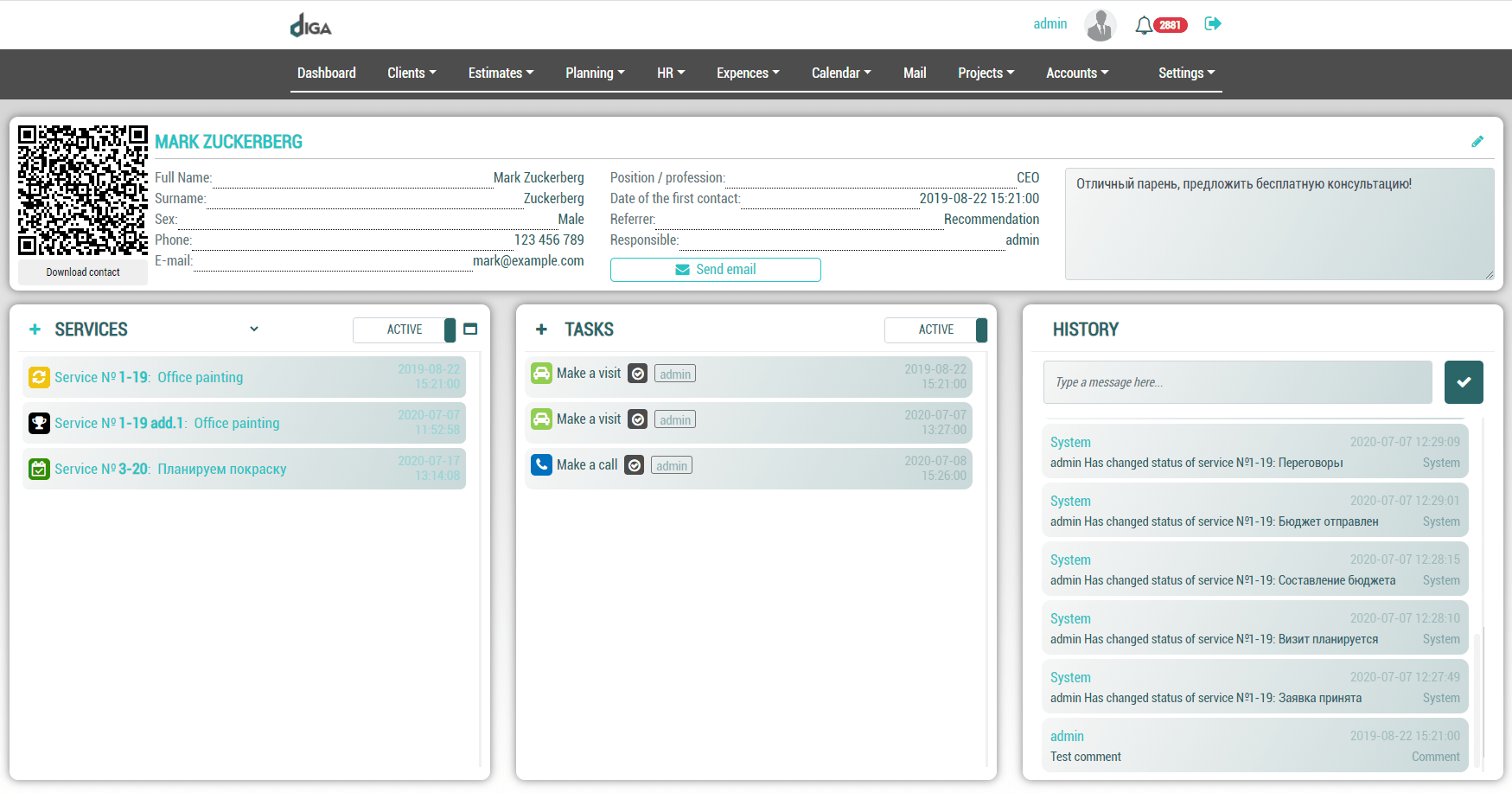A lot has already been said about CRM in reviews and articles. Many of them are written in a complex language, so after reading most of the readers, they do not fully understand all the features of the product. In this article, we will explain what CRM is and what it does for business.
CRM is a common, but quite smart program for managing sales of goods and services. How smart? So much so that it makes it possible to increase profits by up to 50%, improve the quality of customer service, speed up the processing of incoming requests by half, and also reduce costs by automating business processes. But how does the program work? What exactly can she offer you? We, the CRM development team, answer the questions in an accessible and simple language that you will probably ask during our communication.
CRM is an abbreviation of the phrase Customer Relationship Management. The system allows you to automate work processes, establish trusting relationships with customers, minimize managerial mistakes, and ultimately increase sales.
The program itself resembles a regular Excel file spreadsheet, in which many firms keep a customer base. But in CRM, when you click on a counterparty, the so-called "customer card" drops out of the list, which displays the entire history of the relationship with the buyer - from the first call to the conclusion of the transaction. The program itself has the ability to listen to telephone conversations, assign tasks to managers, create template documents, letters for email newsletters, etc.
When a customer who is listed in the database calls, the system opens the card, and the manager already addresses him by name. If before that, another seller was dealing with the client, the colleague will easily answer all questions without clarifications and chimes. The system will automatically notify the buyer about the status of the order through a message to the phone. Thus, you save both your time and the customer, which increases his loyalty to the seller, and also disposes to purchase.

CRM opportunities:
Automation is the crown of the system's capabilities, which allows you to set up sales on the machine without the influence of the "human factor". Everything works well and smoothly. In this case, the system takes care of all routine issues:
- Formation of template documents;
- Setting goals for sellers at all stages of the transaction;
- Sending SMS messages to customers;
- Online reporting;
- Calculation of the cost of purchase / services;
- Monitoring important dates and reminding managers.
CRM minimizes the risk of human error, allowing managers to sell more and the owner to effectively manage the company and not be distracted by control functions.
According to research by a large consulting company conducted in 2019, among the surveyed 500 companies that have implemented a CRM system, an increase in profits of 20-30% in average was noted. For some companies, sales increased by 100-150%.
In addition to sales growth, the introduction of CRM has led to an improvement in other indicators:
Behind each indicator, the gross profit of the enterprise is hidden, which together makes it possible for the business to reach a new level and develop faster:
- The work of sellers is accelerated, there is free time directly for sales.
- Sales volumes and average check are increasing, contributing to the growth of profits.
- Profit growth allows more investments to be directed to business development.
Let's say you are the manager of a small construction company. When you had two dozen clients, everything seemed simple: you received an order, went to the site to assess the scope of work, agreed on a price with the customer, did the work and received money. But what usually happens when there are significantly more customers? They forgot to call one at the agreed time, the second - to issue an invoice, etc. As a result, sooner or later your clients will move to more "advanced" competitors due to the fact that you did not have time to control everyone. To prevent this from happening, and interaction with customers proceeded according to the same scenario, it is time to implement a CRM system:
- First call. When an order appears on the site, a card is generated in the system and a task is set to the seller to call back a potential buyer. If the task is overdue, the manager will receive a notification.
- Measurements:
- 2.1 The manager makes a call directly from the system.
- 2.2 Following the call, the details are recorded in the card.
- 2.3 The task is transferred to the responsible measurer, with the date and time of departure to the facility.
- Coordination. At this stage, the transaction is transferred after the terms of reference are attached to the card, with the dimensions and the necessary working documents.
- Calculation of the cost of the order and call back to the client. The responsible manager makes an estimate, fixes the calculations in the program and calls back to the customer.
- Payment:
- 5.1 A template is automatically generated in CRM, where the order data is entered, including its cost.
- 2.2 Following the call, the details are recorded in the card.
- 5.2 The responsible manager sends information to the customer, waits for payment, and then transfers the task to the "Execution of work" mode.
- Execution of works:
- 6.1. The responsible specialist for repair work, receives a notification with the timing of the work.
The manager can online monitor the status of the application, at each stage of work.
Over time, developers introduce additional functions and capabilities of the system. In order not to overpay for extra and unnecessary CRM functionality, you need to understand what you expect from it.
List of required modules for CRM:

Customer accounting
The entire history of communication with clients is stored here.

Sales management with funnels
Allows you to control the deal at every stage.

Integration with sales channels
All requests (via the website, IP telephony, email) are recorded in the system.

Sales automation
Allows you to automatically set tasks for responsible specialists, send documents and mailings, remind you of the need to call back the client, etc.

Analytics
Allows you to generate online reports on the main indicators of the company with detailed information in the form of graphs and diagrams.

Task management
If a task is overdue, the manager is instantly notified and takes corrective action.
The implementation of the CRM system in the enterprise will increase customer loyalty and increase the conversion of applications, and the manager will have free time to plan and make strategic decisions.
CRM solves 4 very important business problems, in particular:
- Managers will no longer (will not be able to) forget to process requests, as a result of which not a single client will be left unattended.
- You will be able to quickly analyze sales and calculate unscrupulous managers.
- Staff turnover will no longer affect sales - a new salesperson can easily get into the picture.
- The possibility of theft of the client base is excluded - each manager sees only his client.




